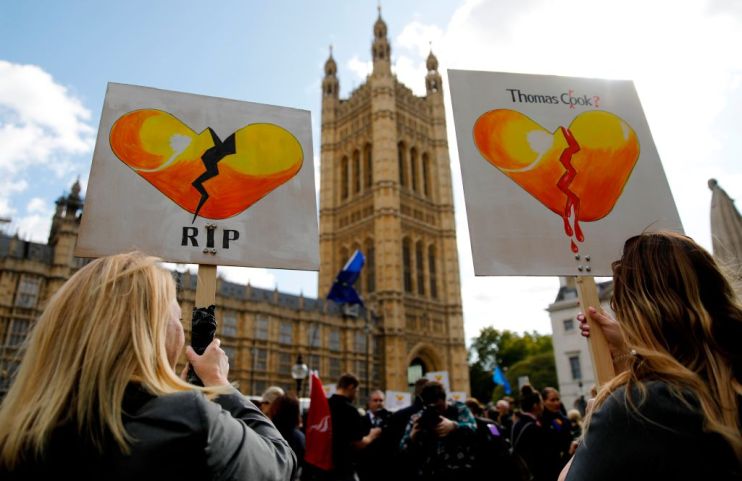MPs slam ‘inconceivable’ judgement of Thomas Cook auditor EY

Thomas Cook’s auditor, EY, has faced a barrage of criticism from MPs, who called it “inconceivable” that accountants judged it a sustainable business in the year leading to its collapse.
Bosses at EY and PwC, two of the so-called big four accountancy firms, were hauled in front of the business select committee this morning as part of a public inquiry into the collapse, which left 150,000 Brits stranded abroad and cost thousands of workers their jobs.
Read more: Thomas Cook CEO Peter Fankhauser: I worked ‘extremely hard’ for pay
EY audit partner Richard Wilson signed the company off as a going concern – an accountancy term for a company that can pay its bills for the next year – in March 2019, just six months before it went bust. This was on the condition its lenders agreed in writing to give it £300m extra cash, because Thomas Cook was saddled with £1.6bn worth of debt.
However, former bosses told MPs last week that the firm’s financial position was so dire that it could not sell off any assets, such as its airline, to raise money at that point, because it would have reduced income to the point of insolvency.
Tory MP Antoinette Sandbach asked Wilson: “How on earth, if that’s the position the company is in, can you call it a going concern?”
Labour MP Peter Kyle added that he found it “inconceivable … that you with your experience thought that kind of future pointed towards a sustainable business”.
Wilson said: “It would have been [a going concern] if they had access to the new facility.”
However, he added, in a previous audit in October 2018, accountants “spent a lot of time understanding how the directors were reaching their opinion that the business was a going concern”.
During that process, he told Thomas Cook directors to reclassify £35m worth of items on the balance sheet which had been put down as “exceptional items”.
Read more: On the Beach swoops in for Thomas Cook market share after collapse
“It [2018] was a difficult year for Thomas Cook in terms of performance, and that led us to scrutinise in a lot of detail the secondary disclosed items,” he told MPs.
That auditor’s decision reduced the profits Thomas Cook was able to announce to £250m for the year, he said, and prompted the its second profit warning in two months in November last year.
PwC faces fresh accusations of ‘conflict of interest’
Meanwhile, PwC, which looked after Thomas Cook’s accounts from 2007 to 2016, faced fresh claims of a “conflict of interest,” in light of the fact it advised the firm’s remuneration committee for several years while also acting as its auditor.
PwC head of audit Hermoine Hudson told MPs the audit and consultancy businesses were independent at the time, so there was no conflict. “I don’t believe that it impacted our audit quality,” she said.
However, she added, PwC had ceased advising for its audit clients because of new regulations. UK accountants have been banned from providing remuneration advice to directors of firms they audit since 2016.
Hudson said: “I do understand how people are concerned about the conflicts of interest.”
“I understand we need to move further than the rules.”
But Labour MP Rachel Reeves, the committee’s chair, said: “PwC’s behaviour has only changed because the rules changed, that was the only thing to actually change your behaviour.
“Only public pressure and changes in the law did that, which is why it is so imperative that we have got to actually change the laws on the consultancy side and the audit side.”
The claims come after the Financial Times published accusations of a conflict of interest over the weekend.
Earlier this week, a PwC spokesperson told City A.M.: “The non-audit work as advisers to the remuneration committee… was approved in advance by the audit committee, complied with all relevant regulatory standards, and was disclosed in the company’s annual reports.”
Read more: Thomas Cook liquidators secure bids for valuable airport slots
Thomas Cook’s annual report from 2009 said the remuneration committee was “mindful” of PwC’s “dual role”.
“PwC held this dual role because prior to the merger they had acted as remuneration adviser to MyTravel Group plc and external auditor to Thomas Cook,” it said. Kepler Associates was appointed as external adviser to the committee in 2009.